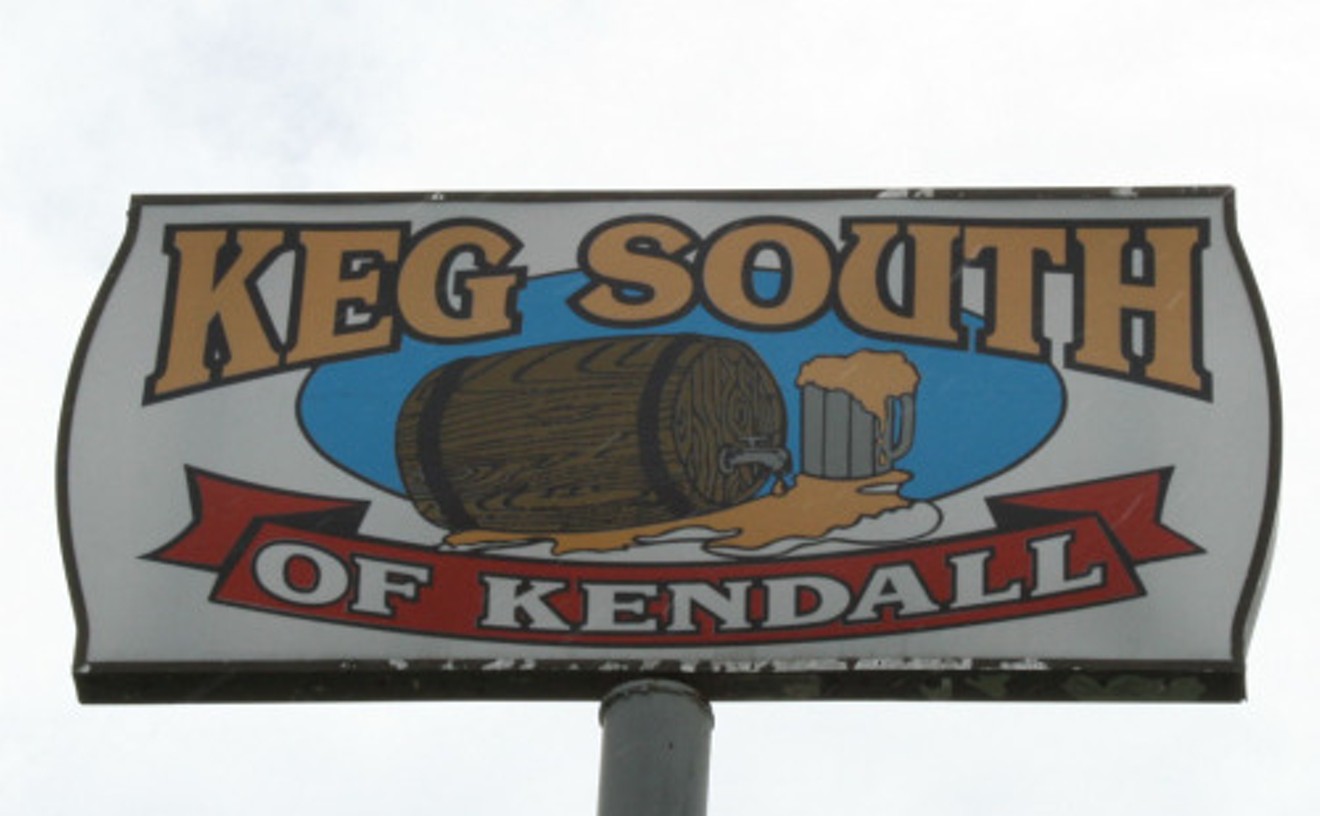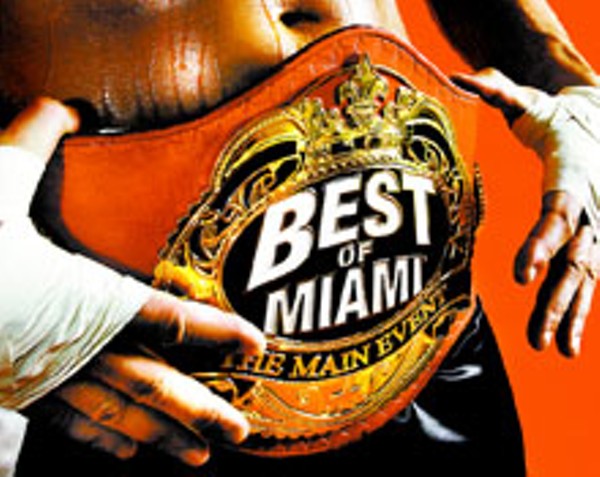Best Songwriter
Raffa Jo Harris
A spacy hippie chick raised in Miami, Raffa Jo Harris is half of folk duo Raffa and Rainer. Her beautifully sensitive ballads are about coincidences, friends, love -- all the sweet things in life -- and they're usually prefaced with a kind of story-behind-the-song. She's often compared to a sweeter Joni Mitchell, and, says one fan, she can make the hardest person go all mushy. Perhaps her next gig should be on I-95 during rush hour.
Best Martini
Biltmore Bar

A sexy librarian walks into another bar. She is still looking for the perfect man, but tonight she settles for the companionship of a perfect martini. Over the years her fickle taste has migrated from gin to vodka. (Go ahead and call her a heathen, but James Bond jumped the juniper berry ship and never looked back.) A year older, a year wiser, and the bar code on her library card a little worse for wear, the bibliophile has gone dirty but still wants class. This swanky bar set in the terribly romantic Biltmore Hotel has the feel of an intimate parlor, with brocade settees, warm candlelight, and black-and-white photos adorning the walls. The charming Octavio mixes a superb beverage -- shaken with enough vigor to splinter the ice without diluting the spirits -- and is happy to lend a sympathetic ear as the librarian scans the room for a traveling businessman who'd be happy to pay for her $14 cocktail (yes, it's a bit much, but that's what you pay for top-shelf in this town). As she sips her seductively smooth and salty libation, the librarian spies a diamond-studded Cartier timepiece on a handsome suit. He extends his hand to make her acquaintance, but the flash of a gold wedding band immediately redirects her gaze across the bar, where she spies a rugged outdoor type holding a Bill Bryson book in one hand and a martini in the other. She smoothes her skirt and lets down her hair before she crosses the room to see how the next chapter of her delicious novel will unfold.
- 1200 Anastasia Ave., Coral Gables, 33134 Map
- 305-913-3200
- biltmorehotel.com/dining/19th.php
Best Mod Rasta Groove
Fitzroy
There's no denyin' that hip-hop/reggae artist Fitzroy has sprung like a lion onto Miami's modern multicultural music scene this year. In only a matter of months, the Bajan journalist-turned-singer became a bar-hold name, packing the house at Jazzid, Transit Lounge, and the patio of Stop Miami, while he swung his massive mane of dreads and sang to the Most High. His sound has a modern, urban flair, enhanced by echoing hip-hop and sound bytes to create a naturally mystic ambiance. Add that to a strong voice, a knack for contemplative lyrics, and a whole lotta stage charisma, complete with cheeky Caribbean humor. His business card reads, "Fitzroy: Available for weddings, birthdays, exorcisms, and resurrections." The artist is packaging those ritual practices on his album Paradise Low, which he hopes to release this spring.
Best Latin Rock Band
Tereso
There's nothing like a rocking family fan club to renew a band's energy. This year Tereso proved that childlike spunk is as important as looking like hardcore punks, when they let the Teresitos (four-year-old Ella, six-year-old Belen, and thirteen-year-old Luna) jump onstage to shake their butts and shout back-up vocals alongside singers uncle Chelo Crocetti and dads Juan and Alejo Rozas. After eleven years together, the bandmates produced their first full-length album, Youth Divine Treasure. The CD offers a hard-driving garage-grunge band sound with an explosion of youthful energy, no doubt a testimony to hanging with the kiddies. But in March the gals had to stay home and prep the newest addition, three-month-old Delfin. Tereso packed its caravan with electric guitars and amps for its first major non-Miami tour -- first stop: Los Angeles -- where the band opened for Volumen Cero.
Best Musical History Lesson
Matthew Sabatella's Ballad of America Project
For years Matthew Sabatella has been an important parochial player, first as the bass player and a singer for masterful rock band Broken Spectacles, then as a sideman for a number of groups, a solo artist, producer, Webmaster. Slight and soft-spoken, he has always been a large and loud presence in South Florida music. If any criticism might be leveled, it would be only that he spread himself a bit thin, trying to accomplish too much both as an artist and advocate. A couple of years ago Sabatella, in the tradition of documentarian Ken Burns, became enmeshed in a vast and significant project: chronicling American history through song. The acoustic Ballad of America, Volume 1: Over a Wide and Fruitful Land has been embraced by critics, museums, and fans. Featuring a number of top South Florida players and instruments such as banjo, fiddle, concertina, resonator guitar, bodhran, harmonica, mandolin, and upright bass behind Sabatella's potent baritone vocals, the record is both modern-sounding and faithful to its inspiration. It includes a twelve-page booklet of histories for each song. The second volume, the musician promises, will be released this year. Flashing forward to the past, Sabatella is bringing forth some beautiful and important music. The commitment he's shown and passion he's clearly felt are equally admirable.
Best Neighborhood Bar/West
Keg South of Kendall

Truly a neighborhood bar, Keg South is family-friendly in the afternoons and early evenings, when the place fills with happy-hour revelers as well as parents with kids still uniformed from soccer or T-ball practice. Tucked away on a sidestreet just across 137th Avenue from the Kendall-Tamiami Airport, this Keg South location (there is another farther south) is the watering hole for residents from Kendall to Country Walk and the many unnamed portions of unincorporated South Miami-Dade that make up the surrounding area. Excellent bar food is available (the catfish po'boy is excellent, as is the simple queso blanco appetizer), and diversions abound: In addition to the TV sets tuned to local sports, the bar boasts a pool table and several arcade-style videogames.
- 12805 SW 136th Ave., Kendall, 33186 Map
- 305-253-2043
- www.kegsouthofkendall.com
Best New Bar
Martini Bar
South Miami and Kendall are not known for wild nights and hedonistic revelry. By 11:00 p.m. the crickets are louder than the burbs between Kendall Drive and Bird Road. Aside from a handful of bars, there's not much for southern suburbanites to do without driving for 30 minutes. Luckily Martini Bar in the Shops at Sunset Place gives a breath of fresh air to the stale nightlife scene south of Brickell. Even though it's located inside a mall, you'll think you're partying it up on Washington Avenue by your third vodka tonic. So drop those shopping bags and pick up a martini glass, because DJs, live bands, and flowing alcohol keep patrons moving to the beat. Happy-hour specials and an In the Biz discount offer additional booty-shaking incentives to the other nightly festivities. One pleasantly unusual advantage that Martini Bar has over its beach-bordering competition is that it's open seven days a week till 5:00 a.m. If you hanker to take an unexpected "sick day" in the middle of the week, Martini Bar is glad to hand you a prescription.
Best Place to Play Pinball
Fun-O-Rama
There was a time, after the extinction of dinosaurs and the ascension of Homo sapiens, when pinball ruled the Earth. Miami, like most major cities, was dotted with arcades housing dozens and dozens of flippered, belled, whistled, and generally colorful games that required concentration, eye-to-hand coordination, and a certain je ne sais quois to master. Then came Pong. Donkey Kong. Space Invaders. Galaga. Mr. and Ms. Pacman. Pinball survived but was relegated to the shadows. Xbox, Nintendo, and PlayStation (the third version of which will be Sony's first global release, an endeavor so far beyond the company's usual Japan-then-other-nations-after-fixing-glitches approach that it has been postponed) have pretty much sent pinball the way of the 'saurs. In the U.S. there were one million machines in play in 1989. Ten years later the number sank to a depressing 360,000. Revenue dipped from $2.4 billion to $1.08 billion in the same period, according to trade publication Vending Times. Five versions of the classic game are available for play at the family-friendly Fun-O-Rama.
Best Latin Singer
Descemer Bueno
Afro-Cuban fusion singer Descemer Bueno's calls home to Havana are echoing from Miami stages across the Florida Straits to the seawall along Malecón Boulevard in the Cuban capital, and even onto Madrid's music scene. Bueno, a founder of legendary Latin funk band Yerba Buena and current frontman of Siete Rayo, boasts a brand of funk, jazz, merengue, reggaeton, hip-hop and Afro-Cuban rhythms all his own. It was recognized with a record deal from Universal Latino, as well as Spain's prestigious Goya Award for Best Music Written for a Film in the movie Havana Blues. When Bueno belts out the song "Habana," it sounds like an eerie cry, a yearning for unification in the Cuban diaspora. "If I never go back, it will break my heart," he sings, followed by a reinforcement of all that he is: "I represent the Afro-Cuban generation." Let's hope that cry will lead to a new understanding of Cuba in all its of political and ethnographic makeup.
Best Nightclub to Die in the Past Year
Chamber Lounge
In the basement of a shuttered hotel at mid-Beach, barflies in the know gathered daily to celebrate the joys of the perfect neighborhood watering hole. Since 1958, Chamber Lounge had served good advice along with impressively stiff drinks (and occasional freebies for those who looked like they merited a hangover). The friendliest bar in town also had the most diverse clientele. On any given night, models and celebs could be seen rubbing elbows with residents and snowbirds while hipsters exchanged toasts with the city's upper crust. The only thing missing was bad attitude. This 2004 Best of Miami winner for Best Neighborhood Bar is scheduled to become yet another condominium conversion.





